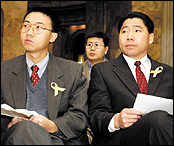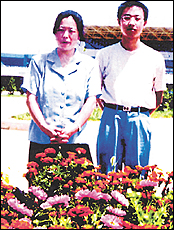Monday, February 3, 2003
 |
 |
| Tie Wu, left, and John Jaw listen as others recount their Falun Gong experiences at a press conference at the State House on Friday. (Photo by Jacob Silberberg) | Tie Wu with his mother. (Contributed photo) |
BOSTON - From an ocean away, Waltham resident Tie Wu could never have known that a simple remedy for a painful gallstone would leave his mother fighting for her spiritual and physical life.
As Wu stood in the State House in front of cameras, taking his story public for the first time, he took the first tentative step to help free his mother from a labor camp in southwest China for the crime of practicing the yoga-like exercises of Falun Gong.
Wu, a 35-year-old computer engineer in Waltham, is one a member of one of four Chinese families in Massachusetts with relatives arrested and jailed in China for their involvement in Falun Gong since the government crackdown in 1999. It was only recently the families mobilized to petition the Massachusetts Legislature to use its influence to gain their loved ones' freedom. They presented their cases at the State House Friday.
"I call for the U.S. government to pay attention to the continued persecution of Falun Gong practitioners in China," Wu said. "They just came to the house and took her. We haven't seen her since. We don't know where the labor camp is and we're not allowed to see her."
It was only through a secondhand source that Wu discovered what had happened to his mother, 52-year-old Tiemu Xueme. Wu said a fellow prisoner told his family after her release of the brutal living conditions in the camp.
With a work schedule of 5 a.m. to 11 p.m. every day and one five-minute shower a month after sleeping on a concrete floor shared with multiple prisoners, luck was on Xueme's side. She was alive.
About 70 million people in China practice Falun Gong, described as a meditative and exercise technique using medical concepts to promote health and spiritual growth. The movements are similar to tai chi, a Chinese self-defense course, but also include teachings from Buddhism and Taoism. Wu said the movements cultivate truthfulness, compassion and forbearance. Falun Gong brochures describe the practice to be a "traditional self-cultivation practice to improve mind, body and spirit."
"After she (Wu's mother) started to practice Falun Gong in 1996, she changed her competitive mentality and angry temperament completely," Wu said. "Her profound change impressed all of her colleagues and friends who came to know her. Her acquaintances all say that it is Falun Gong that transformed her troubled family into a happy and harmonious one."
It was after a peaceful protest in Bejing on April 25, 1999, involving more than 10,000 practitioners, that the Chinese Communist government began its crusade to rid the country of Falun Gong, according to a Falun Gong informational magazine, "Compassion."
The protesters had come to nudge the government to release 45 practitioners detained by police a few days earlier. Thought to have threatened the communist regime with the sheer numbers of practitioners in combination with its ideologies, Wu said hundreds were arrested and detained for years without a legitimate trial.
Wu said his mother continued to practice Falun Gong after it was outlawed and was randomly arrested at her house in 2001. He said his family has not seen her since. They assume her sentence will be three years, but nothing is definite.
Wu, along with the other Chinese immigrants, appealed to the Massachusetts Legislature to assist in their fight to free their family members.
So far, the U.S. House and Senate passed Resolution 218, condemning the persecution, but for Wu and others like him, a rescue effort is not close at hand.
"We want to get his family out of there," American Falun Gong practitioner Michael Carter said. "We have to let more people know that this is going on. This is the greatest country but we need to believe in people, not dollars."
Wu and his wife have spent the last seven years in the United States, but at the end of the year his visa will need to be reviewed. He said he is worried his fight to pull his mother out of the labor camp could affect his ability to stay in the country. [Editor's note: Mr. Wu confirmed that his Chinese passport needs to be renewed soon and there is strong possibility that the Chinese consulate will refuse the renewal application. Without a valid passport, his visa in the U.S. cannot be renewed.]
http://www.dailynewstribune.com/news/local_regional/walt_falungong02032003.htm
Category: Falun Dafa in the Media





